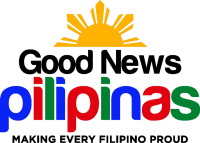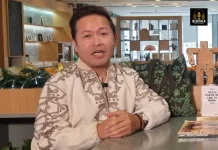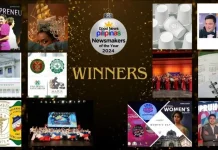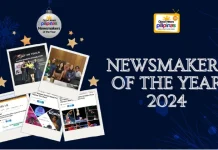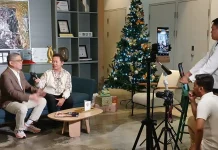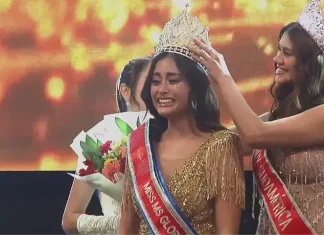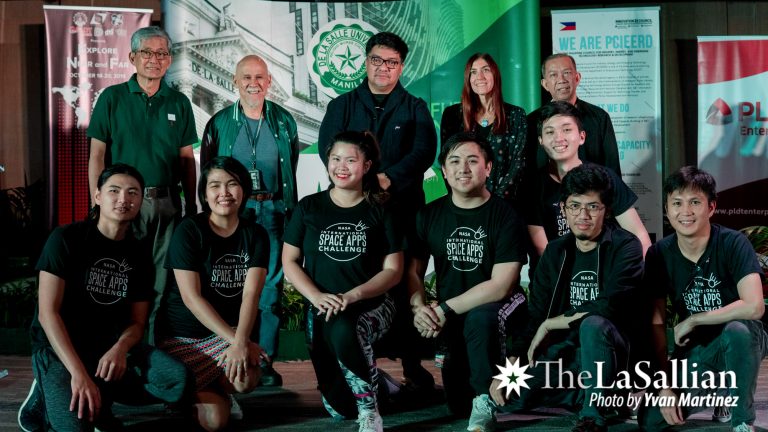
The multi-university Project AEDES and Lasallians’ Ocean 4 won the Manila leg of the 2019 National Aeronautics and Space Administration (NASA) International Space Apps Challenge and earned the right to represent the city in the global qualifiers.
The two projects bested 18 teams selected from 114 applicants who participated in the hackathon, an event where coders, designers, and technologists use NASA’s open data to help solve real challenges on Earth and in space, held from October 18 to 20 at the De La Salle University (DLSU) campus.
NASA Space Apps Challenge reports that two winning entries, Ocean’s Four and Project AEDES, will be competing against the winners of the three-day hackathon, which drew 29,000 participants from more than 230 locations in 80 countries, in the next round of competitions for slots in the 30 global finalists moving on to the NASA Space Apps Challenge championships.
OCEAN’S FOUR PaWIKAN WASTE COLLECTOR
Team Ocean’s Four, composed of Electronics and Communications Engineering students Anton Alejo, Grant Bulaong, Samantha Santos, and Janos Lance Tiberio, presented the PaWIKAN waste collector – a pair of boats capable of collecting and bringing back ocean waste to a designated collection area for proper disposal.
Ocean’s Four uses an automated system to clean up the ocean’s garbage using data from NASA’s Ocean Surface Currents Analyses Real-time (OSCAR) to identify areas with high garbage concentration.
Ocean currents in that area will be mapped in order to understand the direction where the garbage would likely be pushed. Using GPS, a fleet of automated garbage-collecting ships will locate and intercept the floating patches of garbage, split them into smaller patches, and drag them to a mother ship using nets. Ocean’s Four hopes that their method would be able to reduce the manpower needed in cleaning up the ocean.
The PaWiKAN is built with an extended-range radio system based on LoRa technology and Arduino that communicate through sensors and controlled by the deployment station.
“Our global bodies of water are actually littered with plastics. This is a very futuristic solution to help get rid of plastics currently floating or submerged in global waters. It is [a] timely and relevant solution,” said Monchito Ibrahim, Industry Development Committee chairman of the Analytics Association of the Philippines, and former undersecretary of the Department of Information and Communications Technology.
AEDES PROJECT DENGUE TOOL
The AEDES Project team composed of University of the Philippines Diliman’s (UP Diliman) Dominic Vincent Ligot and Frances Claire Tayco, Mark Toledo of Far Eastern University (FEU), and Jansen Dumaliang Lopez of the University of Santo Tomas (UST), developed a forecasting model of dengue cases using climate and digital data that can help locate possible dengue hotspots from satellite data. Project Aedes is a solution to address the threat of a dengue outbreak.
The Data from Sentinel-2 Copernicus and Landsat 8 satellites, DOST-PAGASA for climate and trends from search engines provide a possible dengue presence that will be displayed in a web interface.
Other indices like Fraction of Absorbed Photosynthetic Active Radiation (FAPAR) and Normalized Difference Vegetation Index (NDVI) are used in identifying areas with green vegetation while Normalized Difference Water Index (NDWI) to identify areas with water. Correlating all the data reveals stagnant water areas that are potential breeding grounds for mosquitos.
“It benefits the community especially those countries suffering from malaria and dengue, just like the Philippines. I think it has a global impact. This is the new science to know the potential areas where dengue might occur. It is a good app,” said Engineer Raul Sabularse, Deputy Executive Director of DOST-PCIEERD.
“It is very relevant to the Philippines and other countries which are usually having problems with dengue. The team was able to show that it’s not really difficult to have all the data you need and integrate all of them and make them accessible to everyone for them to be able to use it. It’s a working model. It is something can actually be made usable in a short span of six months,” Ibrahim said.
DLSU President Brother Raymundo Suplido hopes that NASA Space Apps would “encourage our young Filipino researchers and scientists to create ideas and startups based on space science and technology, and pave the way for the promotion and awareness of the programs of our own Philippine space agency.”
Dr. Thomas Zurbuchen, NASA associate administrator for science, said in the NASA media release, “Space Apps is a community of scientists and engineers, artists and hackers coming together to address key issues here on Earth. At the heart of Space Apps are data that come to us from spacecraft flying around Earth and are looking at our world.”
The competition was held in collaboration with the Philippine Council for Industry, Energy and Emerging Technology Research and Development of the Department of Science and Technology (DOST-PCIEERD), Animo Labs technology business incubator, PLDT InnoLab, American Corner Manila, the US government, and part of the Design Week Philippines with Department of Trade and Industry-Design Center of the Philippines.
Both winning teams will join other teams from around the world to be evaluated by NASA for the selection of the 30 global finalists in early December. The top 6 winners will be announced in January 2020. Winners will be invited to visit NASA’s Kennedy Space Center in Florida in 2020.
Last year, the Philippines’ TEAM iNON ISDApp made the Top 25 cut in the global qualifiers and eventually went on to win the 2018 edition of the NASA Space Apps Challenge.
SEND congratulations and well wishes in the comments below to the two DLSU teams competing in the NASA Space Apps Challenge 2019!
Like, Follow, Subscribe to GoodNewsPilipinas.com Facebook, Twitter, Instagram, Good News Pilipinas! TV on YouTube, new story notifications and e-mail newsletters for updates on more Filipino Pride stories.

